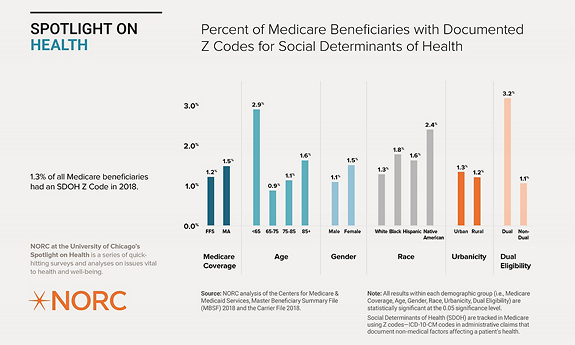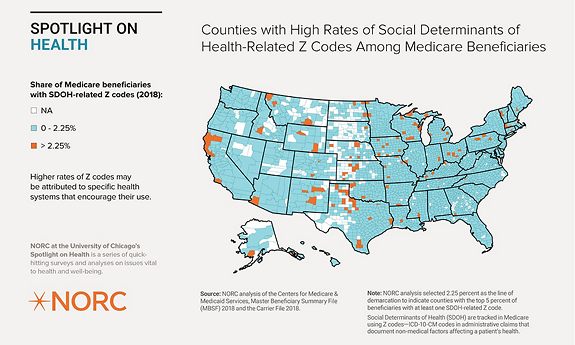Few Physicians Document Social Needs of Older Adults
Policies that improve reimbursement for tracking these needs in the Medicare program could increase the number of older patients whose social needs are met.
CHICAGO, Sept. 30, 2021 – Only 1.3% of Medicare beneficiaries, or about 724,000 individuals, had their social needs tracked in their 2018 health care claims, according to new research from NORC at the University of Chicago.
Social determinants of health (SDOH) are the non-medical conditions of people’s lives—such as housing, food security, and air quality—that impact overall health. According to the World Health Organization, SDOH account for up to 55% of an individual’s health outcomes. In recent years, the Medicare program has implemented numerous initiatives to address beneficiaries’ SDOH.
SDOH are tracked in Medicare using Z codes—ICD-10-CM codes in reimbursement claims that document non-medical factors affecting a patient’s health. Providers are not reimbursed for such claims, however, creating a barrier to uptake. According to the NORC research team, experts and policymakers recommend expanding the use of Z codes, including implementing policies that reimburse providers for using Z codes, to ensure that patients’ social needs are tracked and met.
“Despite the health care system’s widespread focus on individuals’ social needs, few providers are using the existing tools to document patients’ social needs,” said Caroline Pearson, senior vice president at NORC. “Without better reimbursement or other incentives to encourage the use of Z codes, plans and providers will continue to struggle to identify and address unmet social needs.”


Spotlight on Health:
Percent of Medicare Beneficiaries with documented Z Codes for Social Determinants of Health
While general use of Z codes in Medicare is limited, the social needs of some beneficiaries were more likely to be documented. Dual eligible beneficiaries are low-income or disabled individuals who also qualify for Medicaid coverage. These dual eligible beneficiaries were three times more likely to have Z codes documenting their social needs (3.2% of duals) than non-duals (1.1%). Diverse populations were also more likely to have documented social needs, with Black (1.8%) and Hispanic (1.6%) beneficiaries being more likely to have SDOH Z codes than whites (1.3). Finally, Medicare Advantage enrollees were slightly more likely (1.5%) to have documented Z codes than traditional Medicare Fee-for-Service (1.2%).


Spotlight on Health:
Countries with High Rates of Social Determinants of Health-Related Z Codes Among Medicare Beneficiaries
The use of Z codes is also not distributed evenly across the country. Instead, their use is concentrated in select counties and particular health systems, such as areas with large health care systems near Boston and the San Francisco Bay area. The county with the highest proportion of beneficiaries with documented Z codes is Suffolk, MA (6%), where beneficiaries have access to large health care systems such as Massachusetts General Hospital and Boston Medical Center.
“Some hospitals and Medicare Advantage plans have encouraged their providers to begin using Z codes to identify beneficiaries with SDOH risks,” said Dianne Munevar, senior director at NORC. “Those efforts are likely driving higher rates of Z codes among Medicare Advantage enrollees, as well as geographic concentrations of Z codes around specific health systems.”
About NORC at the University of Chicago
NORC at the University of Chicago conducts research and analysis that decision-makers trust. As a nonpartisan research organization and a pioneer in measuring and understanding the world, we have studied almost every aspect of the human experience and every major news event for more than eight decades. Today, we partner with government, corporate, and nonprofit clients around the world to provide the objectivity and expertise necessary to inform the critical decisions facing society.
Contact: For more information, please contact Eric Young at NORC at young-eric@norc.org or (703) 217-6814 (cell).





